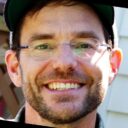Caitlin Wolfe, UVM class of 2011, has her temperature checked “about six times every day,” she tells me, speaking from Liberia, on Africa’s west coast. She’s not sick. “I feel great,” she says. But as a consulting epidemiologist for the World Health Organization — fighting the Ebola epidemic that has killed more than 10,000 people in that region — she and her colleagues face a fair bit of risk. The illness has a death rate up to ninety percent. So they apply an abundance of caution.
“We check our temperatures morning and evening,” she says, plus there are monitors who scan people as they go in and out of offices and clinics in Monrovia, Liberia’s capital. I tried to video chat with Wolfe by Skype on April 6, the day before she was scheduled to return to the US, but the internet was “basically down in all of West Africa,” she said, when I finally reached her. Instead, we spoke on a scratchy, delay-ridden land-line. At night, there are “no street lights” except where people have generators, she says, “because there’s almost no electric grid.” It’s a long way from Wolfe’s childhood: riding Morgan horses in equestrian competitions in Cheshire, Ct.
Past crisis?
Happily, the April 15 “Ebola Situation Report” from the World Health Organization showed zero confirmed new cases of Ebola in Liberia and few infections in both Guinea and Sierra Leone, Liberia’s neighboring countries that were at the epicenter of the devastating outbreak that peaked in the summer and fall of 2014.
“When I got there before Christmas, the number of cases had started to decline, but it was still an emergency,” she says. “Over my time there, it was interesting to see the transition from the middle of a crisis to: how can we move on after this?”
Wolfe’s work with the WHO’s Ebola Surveillance and Response Team has been a series of short-term assignments: upgrading data systems for near-real-time tracking of the disease, and, she says, “training the trainers” who have been assembling teams of workers on the front lines to go house-to-house in remote villages, tracking and helping people who might have the virus. It is part of a global effort to, indeed, move through and past the crisis.
But the risks continue, she says, and many of the same root problems that led to the now-waning epidemic remain in place: pervasive poverty, people who depend on bushmeat for survival, ongoing destruction of forests.
Disease Prevention in Liberia
“One overarching lesson for me is how resilient the Liberian people are,” Wolfe says. “It’s like alphabet city here with all the different NGOs and UN organizations. Everybody comes in here with these awesome ideas — but if there is no community buy-in, as soon as the outsiders leave, the ideas that we put in place are going to fall apart. So the thing that I’ve learned: it’s most important to engage the local community and get their input. They live here.”
Wolfe’s path to the World Health Organization and Liberia’s Ministry of Health led through UVM’s Department of Microbiology and Molecular Genetics. “The first two years, the program kicked my butt,” Wolfe says, laughing in recollection. “I was one of those lucky people in high school who never had to study for anything. I somehow thought that would translate into college.” Not so.
But, “I loved working with microscopes,” she says, “and I found disease prevention really interesting.” Two service trips with a student group, MEDLIFE, to Ecuador and Peru, “opened my eyes to public health,” Wolfe says. There, she witnessed “children who were stunted from parasitic infections,” she says, and who would be treated with medications — only to be quickly re-infected. “That was my moment when I realized I wanted to focus my efforts upstream,” she says, “on the prevention of disease.”
Wolfe is “fun-loving and hard-working,” recalls Stephanie Phelps, a professor in UVM’s microbiology department. And Wolfe’s efforts at college led to admission at Columbia University’s prestigious Mailman School of Public Health, where she earned her Masters in Public Health in 2013. “Thanks to incredibly rigorous, hard-core science classes at UVM, I had an easy time in graduate school,” Wolfe says.
Wolfe is aiming for one more tour of duty in Liberia this summer with the WHO and then she’ll begin a doctoral program in infectious disease epidemiology this fall at the University of South Florida. She returns to school with a sense of humility and mission: Wolfe recalls one tailor she met in Liberia whose business collapsed during the Ebola outbreak, so he joined a team of WHO monitors, looking for people who might have had contact with disease victims. “He was on his motorbike and he picked up a pregnant woman who was bleeding on the side of the road,” Wolfe recalls, “he had barely any personal protective gear, but he couldn’t leave this woman, so he took her to a clinic and last he heard she had survived Ebola. That guy is one of my inspirations.”
Joshua Brown is a staff writer for UVM Communications. This piece was originally published on UVM Today.




